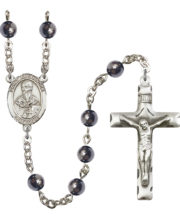Saints
St. Alexander Sauli
Biography of St. Alexander Sauli: The Apostle of Corsica
St. Alexander Sauli was an Italian priest who is called the “Apostle of Corsica”. He is a saint of the Roman Catholic Church. In this blog post, we will explore his life, his achievements, and his legacy.
Early life and religious formation
St. Alexander Sauli was born on February 15, 1534, in Milan, Italy. He belonged to an illustrious Lombard family that had connections with the imperial court of Emperor Charles V. He received a humanistic education at Pavia, where he excelled in Latin, Greek, philosophy, and theology. At the age of 17, he became a page at the emperor’s court in Milan.
However, Alexander felt a call to the religious life and asked to join the Congregation of the Barnabites, a new order founded by St. Anthony Mary Zaccaria in 1533. The Barnabites were dedicated to the reform of the clergy and the laity through preaching, teaching, and spiritual direction. They also practiced poverty, chastity, and obedience.
The Barnabites tested Alexander’s vocation by asking him to carry a large cross through the streets of Milan and to preach about God’s love and the renunciation of the world. Alexander accepted this challenge with courage and fervor, impressing the people and the Barnabites with his eloquence and piety. He was admitted as a postulant on May 17, 1551, the vigil of Pentecost.
Alexander completed his novitiate and made his profession on June 19, 1552. He was ordained a priest on December 20, 1556. He soon became a renowned preacher, teacher, theologian, and spiritual director. He taught philosophy and theology at various Barnabite houses and colleges. He also wrote several works on catechesis, spirituality, and ecclesiology.
Apostolic ministry in Corsica
In 1570, Pope Pius V appointed Alexander as the bishop of Aleria, an ancient diocese in Corsica that had been neglected for centuries. Corsica was a poor and turbulent island that suffered from political unrest, moral decay, and pirate attacks. The Church was in a dismal state: many churches were ruined or abandoned, many priests were ignorant or corrupt, many people were ignorant of the faith or indifferent to it.
Alexander accepted this mission with humility and zeal. He left Milan on April 15, 1571, and arrived in Corsica on May 1. He began his apostolic work by visiting every parish and village in his diocese. He preached the Gospel, administered the sacraments, confirmed thousands of people, reformed the clergy, rebuilt churches, founded schools and seminaries, established confraternities and sodalities, promoted devotion to the Blessed Sacrament and the Blessed Virgin Mary, defended the rights of the poor and oppressed, mediated conflicts and reconciled enemies.
Alexander faced many difficulties and dangers in his ministry. He had to deal with hostile authorities, rebellious nobles, violent factions, and ruthless pirates. He was often threatened, insulted, attacked, and even imprisoned. He also suffered from ill health and fatigue. But he never gave up or complained. He trusted in God’s providence and relied on prayer and penance.
Alexander spent 20 years in Corsica as a faithful shepherd of his flock. He earned the respect and love of his people who called him “the Apostle of Corsica”. He also inspired many vocations to the priesthood and religious life among the Corsicans.
Later life and death
In 1591, Pope Gregory XIV transferred Alexander to the diocese of Pavia in northern Italy. Alexander obeyed this decision but regretted leaving Corsica. He arrived in Pavia on July 8, 1591. He continued his pastoral work with zeal and wisdom. He visited every parish in his new diocese. He reformed the cathedral chapter and the seminary. He convened a synod to implement the decrees of the Council of Trent.
However, Alexander’s health deteriorated rapidly due to his previous labors and hardships. He contracted a fever that weakened him greatly. He sensed that his end was near and prepared himself for death with serenity and faith.
He died on October 11, 1592, at Calosso (Asti), where he had gone to visit a friend. He was 58 years old.
Canonization and legacy
Alexander’s holiness and miracles were widely recognized by his contemporaries. His body was buried in the Barnabite church of St. Paul in Pavia. Many pilgrims came to venerate his relics and to seek his intercession. He was beatified by Pope Benedict XIV on April 23, 1742, and canonized by Pope Pius X on December 11, 1904. His feast day is celebrated on October 11.
Alexander is the patron saint of Corsica, Barnabite seminarians, and the city of Pavia. He is also invoked against fever and pestilence. He is remembered as a model of priestly zeal, episcopal fidelity, and apostolic charity.
Alexander’s writings include a catechism, a treatise on the Eucharist, a commentary on the Psalms, a spiritual directory, and several letters and sermons. His works reveal his profound knowledge of Scripture, tradition, and the fathers of the Church. They also express his love for Christ, the Church, and the souls entrusted to him.
Alexander’s motto was “To suffer and not to die”. He lived this motto until the end, offering his life for the glory of God and the salvation of his people.
Saints Similar to St. Alexander Sauli
You may also be interested in reading the Biography of St. Charles Borromeo. St. Alexander Sauli and St. Charles Borromeo were both bishops in Italy and played roles in the Counter-Reformation. St. Charles Borromeo was the archbishop of Milan and a key figure in implementing the reforms of the Council of Trent. St. Alexander Sauli served as a bishop in Corsica and contributed to the spiritual renewal of the area. Next up: Biography of St. Alexandra
Also check out our handmade St. Alexander Sauli Medal and St. Alexander Sauli Rosary and St. Alexander Sauli Rosary Bracelet.


